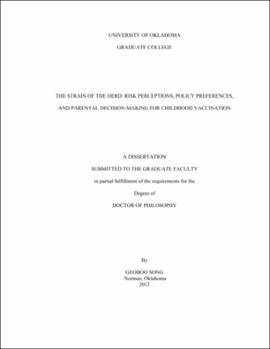| dc.contributor.advisor | Jenkins-Smith, Hank C | |
| dc.creator | Song, Geoboo | |
| dc.date.accessioned | 2019-04-27T21:24:31Z | |
| dc.date.available | 2019-04-27T21:24:31Z | |
| dc.date.issued | 2012 | |
| dc.identifier | 99161175302042 | |
| dc.identifier.uri | https://hdl.handle.net/11244/318606 | |
| dc.description.abstract | As the vaccine controversy continues to deepen in the United States, this dissertation research addresses how we can better understand and deal with this issue in respect to public policy in general and public health policy in particular. Based upon original data from a nationwide Internet survey of 1,213 adults conducted in 2010, this study scrutinizes ways in which individuals' values and beliefs, notably cultural predispositions, shape their differing opinions on the benefits and risks associated with childhood vaccinations and controversial vaccination policies, including mandatory vaccinations and religious/philosophical exemptions, and key related issues of governance. This study also attempts to explain how parents' subjective expected utility of vaccinations (derived from their perceptions of vaccine benefits and risks) and their beliefs regarding current vaccine policies actually translate into their vaccination-related behaviors in regards to the immunization of their own children. | |
| dc.description.abstract | The first empirical chapter (Chapter 3) explains how individuals' grid-group cultural orientations shape their perceptions regarding vaccine benefits and risks at both the societal and individual levels. As Mary Douglas and Aaron Wildavsky's cultural theory of risk perception (Douglas and Wildavsky, 1982) claims, empirical findings derived from robust regression analysis with heteroskedasticity consistent covariance estimation of errors and Bayesian posterior simulations reveal that those with a strong hierarch orientation tend to envision greater vaccination benefits and smaller risks, while those with a strong fatalist tendency are inclined to emphasize risks and downplay benefits. Situated between hierarchs and fatalists, egalitarians are prone to perceive greater benefits and smaller risks than individualists. | |
| dc.description.abstract | Knowing that the benefits and the risks of vaccinations are understood as a sociopolitical construct and a reflection of the competing values and beliefs of different members of society (notably manifested in the form of cultural predispositions), this dissertation research proceeds to examine whether people still hold similar (value motivated, rather than factual evidence based) reasoning patterns when they are involved in policy debates on vaccination. The second empirical chapter (Chapter 4) seeks to explain how individuals' fundamental values regarding a preferred social ordering shape their opinions on controversial vaccination policies and key related issues of governance. As Aaron Wildavsky's cultural theory of policy preference formation (Wildavsky, 1987) posits, empirical findings grounded on robust regression analysis with heteroskedasticity consistent error covariance estimation and Bayesian posterior simulations show that cultural biases have a significant impact on the formation of preferences toward various vaccination policies and governance issues. Hierarchs and egalitarians are more likely to be pro-vaccination, while individualists and (especially) fatalists tend to oppose this view. Hierarchs advocate mandatory vaccination, disapprove of religious and philosophical exemptions, and believe that the government, not parents, should control childhood immunizations. By contrast, fatalists are inclined to reject mandatory vaccination policy in favor of religious and philosophical exemptions and the role of parents in determining vaccination of children. Egalitarians' pro-vaccination inclination is relatively weaker and less consistent than hierarchs', while individualists' anti-vaccination leanings are overall less robust than those of fatalists. | |
| dc.description.abstract | Government health authorities can utilize knowledge concerning the way individuals' cultural orientations shape vaccine benefit-risk perception and policy preference to improve risk communication between the government, experts, and the lay public and to encourage "desirable" (public health enhancing) changes in the general public's attitude toward vaccine risks and related policies. However, this assertion alone does not provide much assistance in terms of practical implications as to how an actual policy outcome can be realized through changes not only in individuals' attitudes and thoughts, but also in their behaviors. This line of thought led to the third empirical chapter (Chapter 5), which essentially examines how American parents' policy related beliefs (e.g., their perceptions of vaccine benefits and risks and related policy preferences) actually translate into their behaviors regarding child vaccinations. The results of an empirical analysis using nested dichotomies logistic regression reveal that parents who perceive high levels of societal and individual benefit from vaccination, a high (very favorable) benefit-risk ratio, and low levels of individual risk are more strongly motivated to have their own child (or children) receive all recommended vaccines. In addition, parents who more strongly support mandatory vaccination policy and are not in favor of religious and philosophical exemptions and parental decision-making rights regarding children's immunizations are more strongly motivated to have their own child(ren) receive all recommended vaccines. | |
| dc.description.abstract | The most important element of these findings is that the vaccine policy debate and related vaccination behaviors are not solely based upon efficacy in reduction of disease or the resulting societal benefits and costs. Rather, it actually gains considerable momentum from the clash of worldviews. An intrinsic value dimension, notably in the form of grid-group cultural orientation, is reflected in the way this debate and related vaccination behaviors have come to stand in for an overarching contest among competing sets of societal norms. | |
| dc.format.extent | 137 pages | |
| dc.format.medium | application.pdf | |
| dc.language | en_US | |
| dc.relation.requires | Adobe Acrobat Reader | |
| dc.subject | Vaccination of children | |
| dc.subject | Vaccines | |
| dc.title | The Strain of the Herd: Risk Perceptions, Policy Preferences, and Parental Decision-Making for Childhood Vaccination | |
| dc.type | text | |
| dc.type | document | |
| dc.thesis.degree | Ph.D. | |
| ou.group | College of Arts and Sciences::Department of Political Science | |
